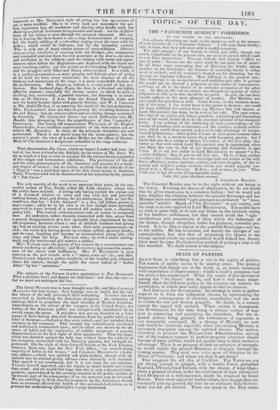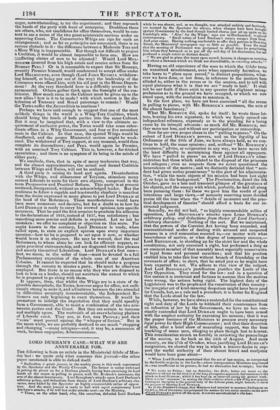STATE OF PARTIES.
AGAIN there is something like a stir in the region of politics. The season of apathy seems to be passing away. The general impression that things are at the worst, is, as usual, connected with expectation of improvement ; which is itself a symptom that the proceis has commenced. What the tesult of this movement among the "dry bones" may be, and how it will more imme- diately affect the different parties in the country, are matters for speculation, in which men really appear to take an interest.
And first as to the Government. An attempt is made to gather support to it, from the influential classes, by representing the dangerous consequences of allowing incendiaries and the mob to violate the law and destroy property. No doubt, to a certain extent the appeal will succeed. When society is threatened, the Government for the time being is always certain of sup- port in repressing and punishing the disturbers. But the re- quired powers being granted, the forbearance of opponents is not necessarily continued. By a change of Ministry no new risk would be incurred, especially when the existing Ministry is extremely unpopular among the agitated classes. The motive, therefore, to preserve the MELBOURNE Administration, arising out of the common consent to protect property whatever should become of party politics, would not operate long to their exclusive advantage. There is no prospect of such an accessions of strength, as would enable the present Ministers to struggle through the coming session. They need sure votes upon all divisions in the House of commons; and where are they to get them? This suggests the old idea of Coalition. The Tories are not yet strong enough to grapple with a hostile Court, perturbed England, O'Connellized Ireland, with the chance of what Oppo- sition a general election, under the excitement of their advent and Lord DURHAM as a rallying-point, might be returned by Great Britain. Their most sagacious leaders admit, that though they are constantly gaining ground, the time for an exclusive Tory Govern- ment has not yet arrived. There are many in the Tory ranks
eager, notwithstanding, to try the experiment; and they reproach the heads of the party with want of enterprise. Doubtless there are others, who, not candidates for office themselves, would be con- tent to see a union of the two great aristocratic sections under an approving Court. The Conservative Whigs are ripe for such an arrangement ; and as far as principles are concerned, there is no serious obstacle to it : the difference between a Moderate Tory and a Mere Whig is inappreciable. But though not difficult to project a Coalition, it would be almost impossible to form one. How are
nfticting claims of men to be adjusted ? Would Lord MET.- sotitm descend from his high estate and receive orders from Sir ROBERT PEEL? Or is it reasonable to expect that Sir ROBERT, recently Premier himself, would condescend to accept office under Lord MELBOURNE, even though (Lord JOHN RUSSELL withdraw- ing himself, or 'seine' put out of the way) the leadership of the Commons were offered him, with his old post in the Home Depart- ment? At the very threshold here is a difficulty scarcely to be surmounted. Others gather thick upon the foresight of the coa- litionist. How much room in the Cabinet must be given up to the new allies ? how is it to be made ? with which section is the dis- tribution of Treasury and Royal patronage to remain ? Would the Tories suffer the favouritism to continue ? Perhaps we have said enough to suggest that one of the most unlikely things in the world is a Whig-Tory Coalition, which should bring the heads of both parties into the same Cabinet. But it may be imagined that, with a view to the ultimate ac- quirement of exclusive power, the Tories would take some subor- dinate offices in a Whig Government, and four or five secondary seats in the Cabinet. In that case, the ejected Whigs would be disaffected, and the proper Ministerial section might be weak- ened. The withdrawal of Tory support, at any moment, would then complete its discomfiture ; and PEEL would again be Premier, with an unmixed Tory Cabinet. This is, however, a far-fetched speculation ; and there is no symptom of its being in the minds of either party.
We conclude, then, that in spite of many tendencies that way, and the closest approximations, the actual and formal Coalition between Whigs and Tories, will not be realized.
A third party is raising its head and spirits. Dissatisfaction with the Whigs, and abhorrence of Toryism, stimulate many earnest Liberals to unite for their own objects, comprised in the term Progressive and Practical Reform. This party is at present scattered, disorganized, without an acknowledged leader. But the readiness to follow a capable and trustworthy chieftain is manifest from the desire expressed in many places to put Lord DURHAM at the head of the Reformers. These manifestations would have been more numerous and decisive, but for a doubt as to how far Lord DURHAM is ready to carry his avowed opinions into specific measures. That he used the first occasion to proclaim his adhesion to the declarations of 1834, instead of 1837, was satisfactory ; but something more precise and definite is required. Let us not be mistaken : we offer no complaint or objection on this score. For aught known to the contrary, Lord DURHAM is ready, when
called upon, to state an explicit opinion upon every important question—how far he is prepared to act upon it now, or whether would leave it in abeyance. He may be warned, that the real Reformers, to whom alone he can look for efficient support, re- quire practical statesmanship, and are disgusted with fine phrases
and merely theoretical Liberalism. Lord DURHAM'S first care—
first, we mean, in the order of time—must be devoted to a full Parliamentary exposition of the whole case of our American Colonies. It cannot be expected that he should make a progress through the country to muster a party. He must be otherwise employed. But there is no reason why they who are disposed to look to him as a leader, should not ascertain the extent to which he is prepared to go along with them. It appears, then, that whilst the Whigs are in a state of' de- plorable decrepitude, the Tories, however eager for office, not suffi- ciently strong to seize it, and a Coalition between the two attended by difficulties seemingly insurmountable, the Independent Re- formers are only beginning to exert themselves. It would be premature to indulge the expectation that they could speedily form a Government, able to resist a combination of the two aris- tocratic parties and the Court. But they are certain to increase and multiply apace. The materials of an overwhelming phalanx
of Liberals exist. They are, in fact, THE PEOPLE; and their "voice" must prevail against the "whisper of faction." But in the mean while, we are probably destined to see much "chopping and changing '—many intrigues—and, it may be, a succession of weak, because unpopular, Administrations.



























 Previous page
Previous page